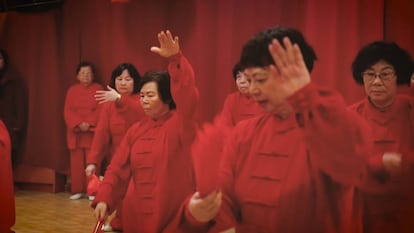“I don’t want to be buried next to my mother in China. I will die here”
More elderly Chinese people are choosing to see out their final days in Spain despite language and cultural barriers

Xingshan Zheng arrived in Spain in 1987 when she was 43 years old. She had decided to leave her home in China where she had taught Latin American literature in Beijing for almost two decades to look for a better future. She was not alone. Many people left China during this period to start a new life in Spain, which had recently joined the European Union. Now, 30 years later, they are seniors.
Only 3,500 Chinese people in Spain are over the age of 65
“Spanish people ask us where are the old Chinese people and I tell them we are here, but perhaps they think we are younger because of how we look,” says Zheng. In 2002, when she was 58, Zheng decided to create a center in the middle of Madrid’s so-called Chinatown in Usera where elderly Chinese immigrants who had not returned to China could come together every day and enjoy cultural activities. “We realized that the parents of Chinese shopkeepers spent all day by themselves without anyone to talk to,” says Zheng, who has energy beyond her 74 years – an energy that has kept her going as she worked as a translator and as a waitress in Chinese restaurants to help her family get ahead.
The center has more than 400 members. “The average member is around 60 years old. Last year, the oldest was 94, now the oldest is 90,” says Xu Songling, acting president of the cultural center. Members practice tai chi and dances, sing opera and perform in an orchestra. Others play ping pong or spend the afternoon playing board games. “The men can spend all day playing mahjong,” says Zheng, referring to the tile-based game that dates back to the Qing dynasty. “But the women do lots more things,” she says proudly, with a cigarette in her mouth.
I always thought that I would return to Hong Kong so I never learned to speak Spanish Mok Ying, 87-year-old center member
While most of the members at the center have spent three decades living in Spain, few have overcome the language and cultural barrier, which has made it difficult for them to mix with people who aren’t Chinese. What’s more, there are only a few elderly Chinese people still in Spain. Of the 207,000 Chinese people in Spain, only around 3,500 are over 65, according to the National Institute of Statistics (INE). But in the last decade, this number has doubled.
At 87 years of age, Mok Ying is probably the member who has spent the most number of years in Spain – 54 in total. She and her husband, both from Hong Kong, were some of the first to arrive in Spain in the 70s – an era when people from mainland China were still not allowed to leave, her daughter Manyee Lam explains in perfect Spanish. “In the beginning, with work and family I didn’t have time to study. And I always thought that I would return to Hong Kong so I never learned to speak Spanish,” says Mok, while her daughter translates.
“We have a saying we always repeat: the leaves that fall return to the root,” says Zheng, who explains that in Chinese culture, people return to their homeland to die. But she recognizes this tradition is no longer relevant for many, including her, because now their roots are in Spain. “I don’t want to be buried next to my mother in China. I will die here surrounded by my children and grandchildren,” she says.
English version by Melissa Kitson.
Tu suscripción se está usando en otro dispositivo
¿Quieres añadir otro usuario a tu suscripción?
Si continúas leyendo en este dispositivo, no se podrá leer en el otro.
FlechaTu suscripción se está usando en otro dispositivo y solo puedes acceder a EL PAÍS desde un dispositivo a la vez.
Si quieres compartir tu cuenta, cambia tu suscripción a la modalidad Premium, así podrás añadir otro usuario. Cada uno accederá con su propia cuenta de email, lo que os permitirá personalizar vuestra experiencia en EL PAÍS.
¿Tienes una suscripción de empresa? Accede aquí para contratar más cuentas.
En el caso de no saber quién está usando tu cuenta, te recomendamos cambiar tu contraseña aquí.
Si decides continuar compartiendo tu cuenta, este mensaje se mostrará en tu dispositivo y en el de la otra persona que está usando tu cuenta de forma indefinida, afectando a tu experiencia de lectura. Puedes consultar aquí los términos y condiciones de la suscripción digital.








































